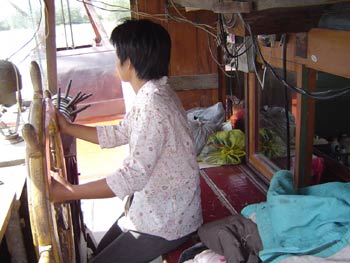|
Polluting boats ban changes way of life
By Miao Qing (China Daily)
Updated: 2005-10-27 05:50
Gao Xiaomian, a 44-year-old woman whose family has lived on boats for
generations, was close to tears when informed that her home, a diesel powered
boat, would be banned from the Huangpu River from the start of October.
"Of course, I do not want to leave. But it seems that eventually I have to,"
she said during an interview with the Shanghai Star before rules banning diesel
boats from the fiver came into effect.
The shabby vessel is more than a home to Gao and her
48-year-old husband they rely on it to make a living. Plying the Huangpu River
and its tributaries, Gao's family collects scrap iron, spilled from other
vessels, using a large magnet which reaches deep into the water.

Cui Haiping's wife steers their boat from the
cramped cabin. Following the recent ban on diesel powered boats on the
Huangpu River, many boat owners had to return to their hometowns, usually
in less-developed areas of Jiangsu, Anhui and Zhejiang Provinces. [China
Daily] |
Their source of income depends entirely on being able to navigate the routes
used by large cargo ships. Their only other source of income is fishing, which
is not nearly so dependable or lucrative.
"It would be very lucky for us to make about 20-30 yuan (US$2.50-3.70) a day
by collecting iron. Sometimes we just draw a blank in the water, as we did
yesterday," said Gao, who is worried they will lose their only regular income if
their boat is forced to return to the Qingpu District on the outskirts of
Shanghai, where they came from.
Reason for ban
Diesel powered boats mostly carry only small loads and cause serious
pollution, according to Chang Fuzhi, vice-dean of the Shanghai Marine Safety
Administration.
Since the beginning of 2005, the agency has been taking steps to ban diesel
boats from the five urban inner rivers flowing into the Huangpu.
The inspection department of the agency found there were about 200 diesel
boats on the Huangpu River, before the ban went into effect this month.
The administration has called the ban a "prudent move at an appropriate
time," pointing out the harm diesel engines do to the marine environment.
Excessive noise from diesel engines and the disposal of used oil directly into
the water by boat operators were problems the administration highlighted.
Most of the existing diesel boats no longer deal with freight services but
have become involved in what officials called "marginal work." Many of the
diesel boats, like Gao's, salvage scrap iron, coal and other rubbish collected
from the Huangpu. Others retrieve discarded oil and sell it to illegal
refineries for re-use, according to Qu Chun, director of Ship Inspection
Department with the administration.
Qu said use of the reprocessed oil causes even more environmental pollution.
A few diesel boat owners catch fish and eels, and some are used as unlicensed
ferries.
Because of the nature and variety of the work they do,
diesel boats are often involved in a high number accidents on the river, said
Qu.
|